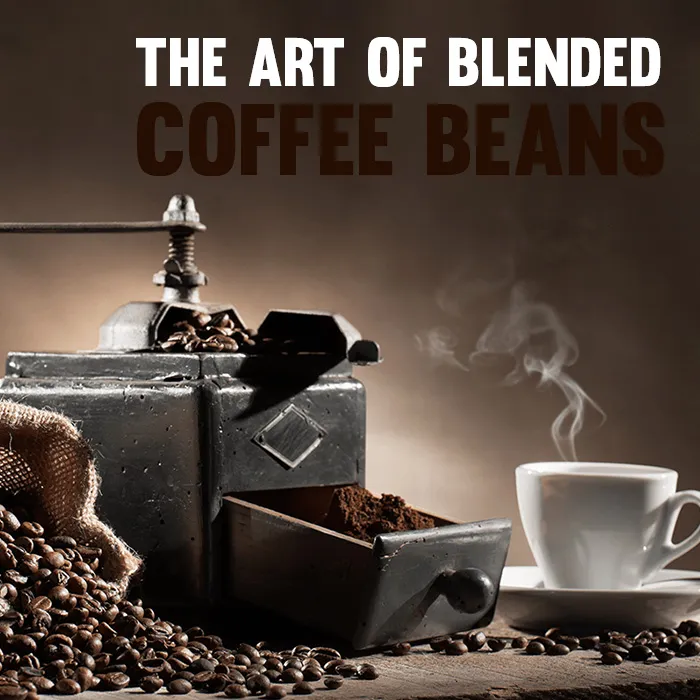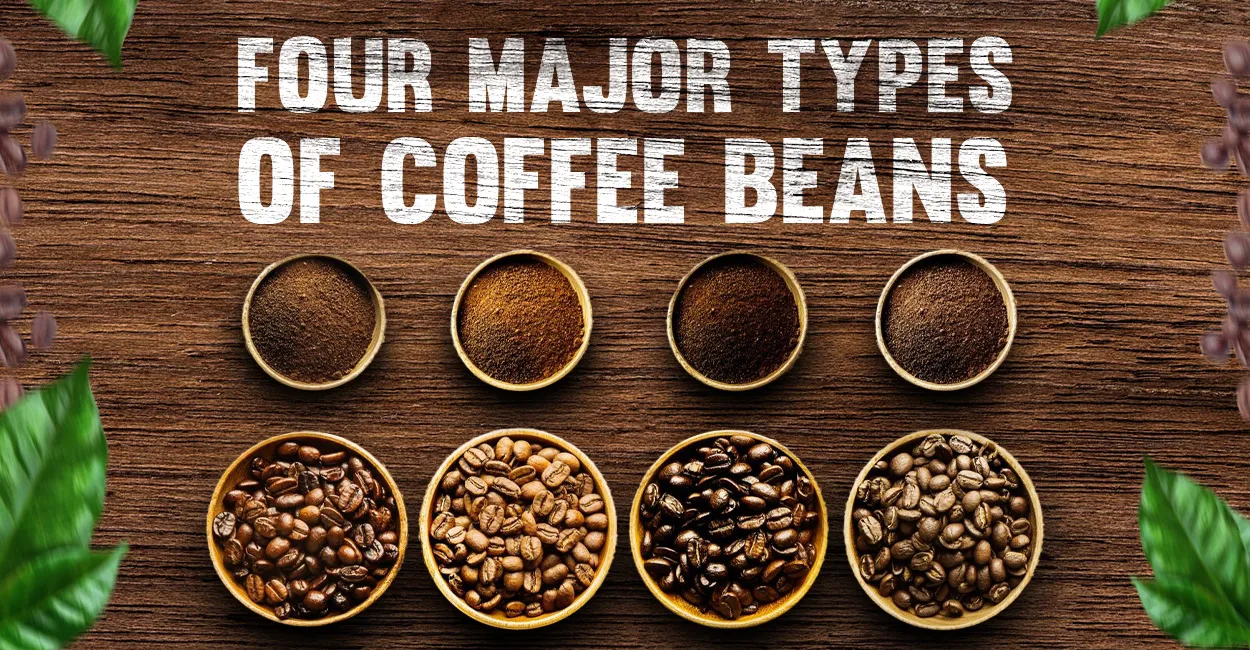Millions of people drink coffee daily. Coffee’s primary use is increasing mental alertness, but it also boosts energy, enhances cognitive and physical activities, and strengthens endurance.
Do You Know?
Statista
A study in the U.S. in 2023 stated that 65% of people drink coffee in the last 24 hours. Just imagine how much the population is addicted to coffee.
Now, what comes to our mind is whether all people have the same taste and drink the same coffee. There is a probability that they will take the different coffee. Different types of coffee beans come from other sources.
The coffee beans have a great flavor and aroma effect on your drink. If you are a coffee lover, you want to know about the major types, their profiles, the differences, the effects, and how to choose your coffee type. Let’s find out what kind of coffee you want together!
What Are Coffee Beans?
Coffee beans are the source of the world-famous coffee beverage, which comes from the coffee tree. The bean is named after it because its shape resembles a bean, but technically it is not. They are inside a fruit with a pit like the cherry; their fruit is also called coffee cherry.
In making our drink, the coffee cherry is wasted. We remove the pit and use the inner seed, which is then roasted and used to make coffee. To achieve the desired flavor and aroma, the seeds must be roasted. Thus, the type of coffee bean is the key to developing complex coffee flavor.

The Four Different Types of Coffee Beans
- Arabica
- Robusta
- Liberica
- Excelsa
are the leading coffee beans used worldwide. Let’s learn their distinct features.
| BEAN VARIETY | ORIGIN | FLAVOUR PROFILE | AROMA | CAFFEINE CONTENT | BEST USE |
|---|---|---|---|---|---|
| Arabica | Native of Ethiopia | Sweat and Fruity | Floral | 1.2 – 1.5% | Specialty brews, espresso |
| Robusta | Central and West Africa | Woody | Earthy | 2.2 – 2.7% | Blends, Instant coffee |
| Liberia | West Africa and Malaysia | Fruity, floral, woody, smoky, spicy | Woody | 1.2 – 1.5% | Unique blends, specialty drinks |
| Excelsa | South East Asia | Tart, fruity, dark, complex, unique | Fruity | 1.0 – 1.2% | Blends |
Rich Flavors of Arabica Coffee Beans
The first cultivated type of coffee grows in places with many shades and steady rainfall. Almost sixty percent of the world’s coffee is made of Arabica coffee beans. Although primary production is in Ethiopia, coffee is cultivated throughout Asian, African, and American countries, mainly in high-altitude regions with tropical climates.
Arabica coffee beans have a comprehensive profile of rich flavors. They include a fruity, sweet taste with floral notes and berry aromas. The taste of Arabica coffee beans may be pleasant if you like fruity acidity and no bitterness. As the taste depends on the coffee bean type, the taste intensity depends on the degree of roasting.
You may choose Arabica coffee beans if you crave sugar and want coffee to increase your focus. They have a smoother and slicker taste with nuts and sugar flavor notes. Arabica coffee is the perfect beverage and a favorite among coffee lovers. Freshen your mood with this great choice.
Robusta Coffee Beans: Bold and Strong
The second most popular variety of coffee beans is Robusta. Its origin is in Africa and is popular in Europe, Africa, and Asia. The name of the type exactly matches its taste profile: harsh, bold, and strong. This type of coffee is best for people who like intense flavors, as it is more robust, fierce, and bitter than other coffee types.
Robusta coffee’s aroma is earthy and woody, representing its hearty flavor. Vietnam is the largest robusta coffee producer; other producers include Brazil, Indonesia, and Africa. Robusta is less expensive because it is less prone to pest attacks and diseases than Arabica coffee; therefore, it has a significant commercial demand. You can roast the robusta coffee beans according to your preferences. Enjoy your unique coffee taste and boost your energy levels!
The Unique Taste of Liberia Coffee Beans
Liberica Coffee beans have unique blends and a distinct taste that you can love or hate. Less than 2 percent of the world’s coffee supply is Liberica coffee. It is an exotic and rare coffee that became popular in the 1880s after its discovery because of its strong resistance to fungal attacks and coffee rust. However, its production cannot be scaled up to the commercial level as it needs a specific climate for its growth.
Its coffee beans are the largest among other coffee types, having irregular shapes. As they are, Shapes have a unique taste, too. The coffee bean is said to have a strangely nutty, woody, and solid flavor, which can make a few espressos flavourful. However, some people do not like its taste; coffee enthusiasts always look for coffee beans. If you find Liberica Coffee beans, you must give them a try.
Excelsa Coffee Beans: A Hidden Gem
The last type of coffee beans is Excelsa. It makes up only 7% of the world’s coffee. It is a hidden gem that combines light notes, tart and fruity flavors. Excelsa coffee beans are primarily used in different blends rather than in a single coffee production.
It is fantastic to know that it is the subtype of Liberica coffee beans, but as it has its unique flavors and aromas, it has established its distinct species. The unique and deep flavor of Excelsa beans makes them hard to find outside of Southeast Asia, so you might need to get them from a specialty retailer.
Why Do Single-Origin Coffee Beans Matter?
They source coffee beans from one source, one country, rather than collecting coffee beans from all over the world. Different geographical areas have different soils that give coffee beans different agricultural characteristics. Differences in temperature, humidity, soil moisture, water, and humidity affect taste and aroma.
A single source of coffee beans is essential for coffee quality. When industries or markets have single-origin coffee beans, they can trace the origin and determine whether they have used good agricultural practices. Single-origin coffee beans offer special and unique flavors that you will never find from mixed beans because the original bean qualities have stayed the same.
The Art of Blended Coffee Beans
Blended coffee beans are the art of mixing coffee beans from different geographical regions and varieties. They are roasted to a level that achieves a unique and specific flavor. In Italian tradition, blended coffee beans are called espresso.
Espresso is made from different types of coffee beans. Coffee master knows which beans to use, how many to roast, and how much to make the perfect espresso. This art is used widely today and emphasizes four major determinants: bitterness, taste, body, and aroma.

Why Blended Coffee?
- To create complex flavors by combining coffee beans with different notes.
- The same taste and aroma will be maintained even as the seasons change to achieve consistency and flavor throughout the year.
- To make coffee inexpensive and accessible to everyone, we may blend cheap beans with expensive beans and manage the overall cost.
Frequently Asked Questions
How Long Do Coffee Beans Last?
The shape and packaging of the bean determine its durability and longevity. Beans in solid form are kept for over a year, but open beans are kept for months.
How to Roast Coffee Beans?
Rotating the coffee beans is straightforward. Place a tray on a baking tray on baking paper and bake in a hot convection oven for 15-20 minutes.
Final Thoughts
All four types, i.e., Arabica, Robusta, Liberia, and Exelsa, have unique and distinct aroma and taste profiles. We hope you now understand the four primary coffee bean types and can enhance your coffee experience by choosing the coffee that matches your taste preferences. Select the coffee according to your taste and cherish the perfect cup!

